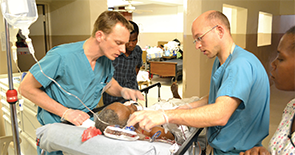The CHANCE program is one of several medical humanitarian programs with a focus on otolaryngology. While emergency physicians and tropical and infectious disease experts often flock to areas following political unrest, infectious outbreaks such as Ebola or Zika, or weather- or terrorism-related catastrophes, opportunities best suited for otolaryngologists will utilize their specific training. Finding those opportunities requires a lot of research, as well as knowing what motivates you. Being specific about what you are seeking helps volunteers find the best match with available programs.
Explore This Issue
June 2016
Joe Curry, MD, and Dr. Luginbuhl checking on a postoperative laryngectomy patient at the Hospital Lumiere in Bonne Fin, Haiti.
Courtesy of Adam Luginbuhl, MD
“You want to be a value-add, and part of that value-add is being able to arrive in an area with your boots on the ground with a program that has a presence in that situation,” said Nancy Kelly, MHS, founder and executive director of Health Volunteers Overseas, a nonprofit that develops programs to improve and sustain healthcare in resource-poor countries and sends volunteers of different medical specialties to run them, featuring education, training, and professional development. “You want to know that you are actually helping. If not, you’re more like a net drain.”
Personal and Professional Benefits
For physicians like Dr. Luginbuhl, doing good outweighs any of the challenges he and his colleagues face when working with few resources. “When we first went down to Haiti with a microscope and rudimentary tools, we didn’t know what we would find,” he said. “There were no instruments, no disposables, nothing. Over the past three years, we’ve developed a full complement of two surgical suites through donations from Stryker for our saws and drills, and we get as much as we can get donated from our university, vendors, and U.S.-based patients who give donations.”
One of the most profound aspects of his experience has been seeing American patients donate funds to help fund procedures for Haitian patients with diagnoses similar to their own, said Dr. Luginbuhl.
Connecting with others who are dedicated to similar goals has been another benefit, said Matthew L. Bush, MD, an associate professor in the department of otolaryngology-head and neck surgery at the University of Kentucky Medical Center in Lexington. Through The Sikiza (Listening) Society, a partnership between the University of Kentucky and Kenya’s University of Nairobi, Dr. Bush and his Nairobi colleague John Ayugi, MMED, developed a program that has helped to expand the African school’s otolaryngology training and practice. Since 2012, Dr. Bush and colleagues have traveled to Kenya to assist with surgeries, provide lectures, and engage in research. Dr. Ayugi and his African colleagues have also made reciprocal visits to Kentucky.